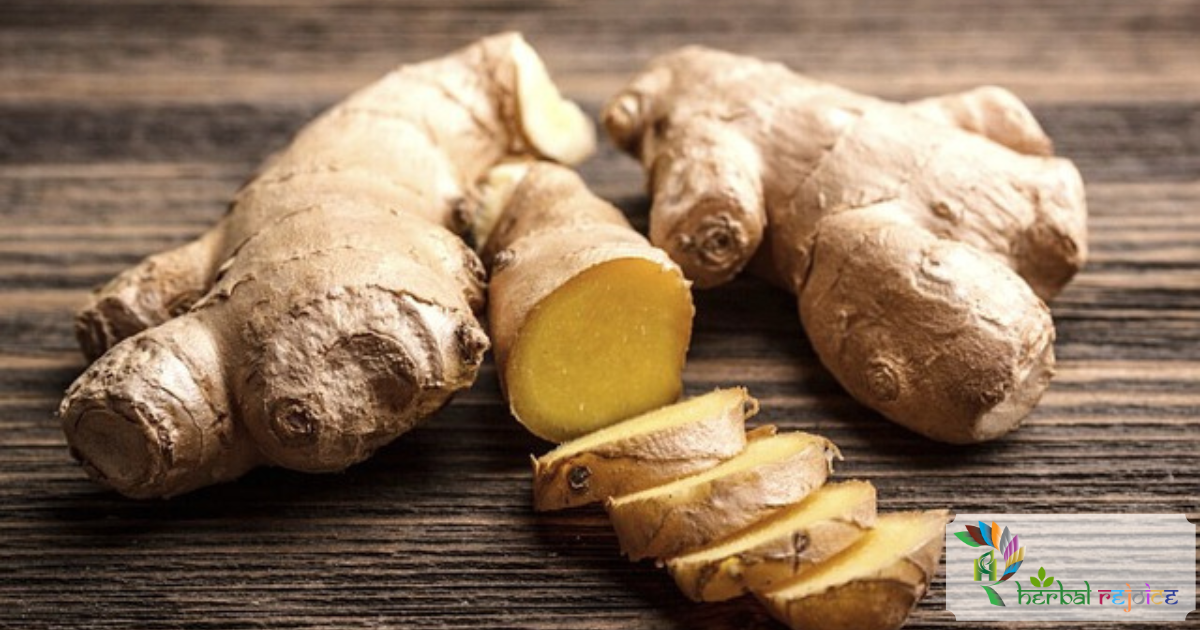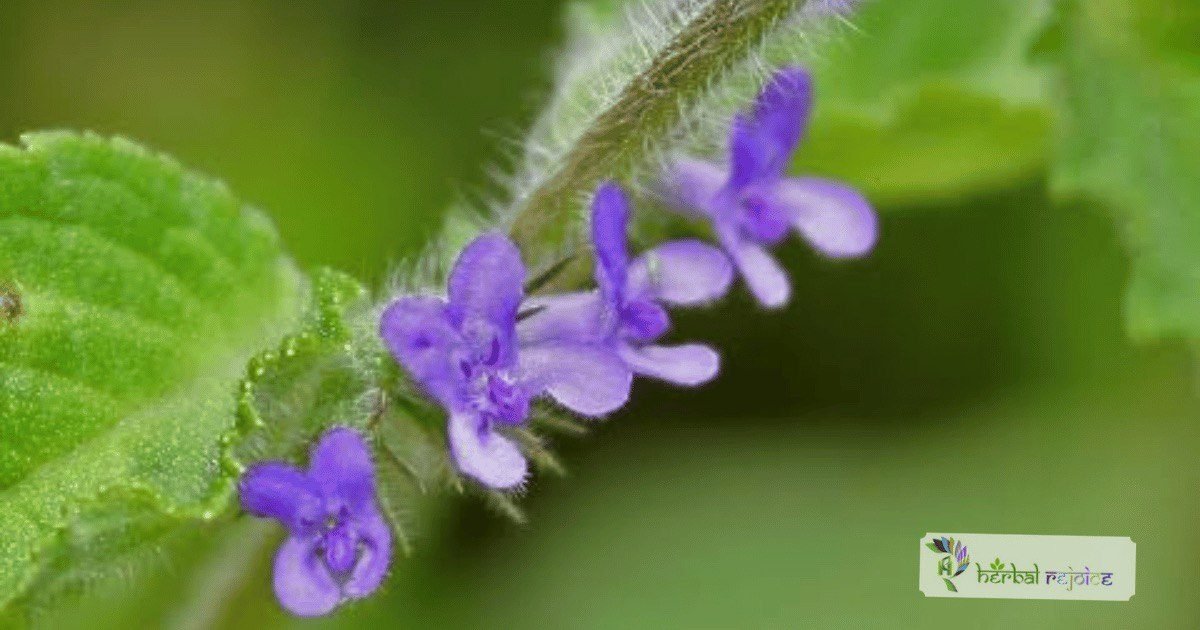Discover Culinary Marvel & Health Benefits of Ginger. Natural Remedy for Motion Sickness, Aiding Digestion, Pregnancy Relief, Cancer Chemotherapy Support & More. Explore Practical Uses at Herbal Rejoice!
Biological Source:

Ginger, scientifically known as Zingiber officinale Roscoe and part of the Zingiberaceae family, is a remarkable rhizome with numerous health benefits. This ancient botanical treasure is a true gift of nature.
Geographical Source:
Though native to South East Asia, ginger is now cultivated in various regions across the globe, including Caribbean islands, Africa, Australia, Mauritius, Jamaica, Taiwan, and India, remarkably, over 35% of the world’s ginger production comes from India.
Chemical Constituents:
Ginger boasts diverse chemical constituents that contribute to its remarkable properties. These include volatile oil (1-4%), starch (40-60%), fat (10%), fibre (5%), inorganic material (6%), residual moisture (10%), and acrid resinous matter (5-8%).
Additionally, its volatile oil contains monoterpene hydrocarbons, sesquiterpene hydrocarbons, oxygenated mono and sesquiterpenes, and phenyl propanoids.
Unravelling the Power of Ginger: Its Versatility and Uses
Ginger’s wide range of uses makes it a powerful ally in promoting health and well-being. From culinary delights to medicinal remedies, ginger shines as a multipurpose botanical.
1. Culinary Marvel:
Ginger has graced kitchens across cultures for centuries, enhancing the flavour of various dishes. Its aromatic and pungent attributes add a delightful twist to mouth-watering recipes.
Ginger oil is also a key ingredient in mouthwashes, ginger beverages, and liquors, further exemplifying its versatility.
2. Natural Remedy for Motion Sickness:
Research indicates ginger powder efficiently counters motion sickness, offering a natural solution for individuals susceptible to travel-related discomfort.
Its adsorbent, aromatic, and carminative properties ease gastrointestinal reactions and nausea.
3. Aiding Digestion and Stimulating circulation:
Ginger’s remarkable effects on the digestive system make it an invaluable ally.
Ginger successfully treats nausea and vomiting by stimulating the release of salivary enzymes and improving stomach emptying.
Furthermore, its potential benefits on circulation, including reducing cholesterol levels and platelet stickiness, have been noted for thousands of years.
4. A Natural Solution for Morning Sickness:
Pregnancy can bring about morning sickness, and ginger offers a safe and effective remedy.
Studies have shown that nearly three out of four pregnant women experienced relief from nausea with minimal side effects. Even though people have concerns about using ginger during pregnancy, there haven’t been any documented cases of ginger causing harm.
5. Promising Antinausea Support for Cancer Chemotherapy:
Ginger shows promise in easing nausea associated with cancer chemotherapy.
Research has revealed its effectiveness in stimulating the stomach to empty after administering potent chemotherapy drugs.
With the potential for comparable efficacy to conventional drugs, ginger presents a more accessible and cost-effective alternative.
Practical Applications of Ginger in Everyday Life:
At Herbal Rejoice, we celebrate ginger’s healing properties and incorporate it into various wellness practices.
1. Gingerroot Tea for Detoxification:
As part of our detoxification program, we encourage guests and patients to savour three to four cups of fresh gingerroot tea daily.
This herbal apéritif, combining gingerroot juice with water, lemon juice, and honey, kick-starts the digestive process and supports gastrointestinal function.
2. External Uses for Pain Relief:
For external purposes, ginger juice, when mixed with carrier oils like almond or sesame, is a soothing massage treatment for sore muscles and joints.
Its mild local heating effect and ability to stimulate local circulation make it a reliable counterirritant for rheumatic conditions.
3. Clearing Respiratory and Circulatory Issues:
For those experiencing respiratory or circulatory challenges, ginger tea or fresh/candied ginger is an excellent natural remedy. Whether you suffer from cold hands and feet or need relief from congestion, ginger can provide the warmth and comfort you seek.
4. Ginger as Your Travel Companion:
For travellers braving turbulent plane rides or boat journeys, keeping a piece of fresh ginger on hand can be a natural and effective way to alleviate queasiness.
Its calming effects on the stomach make it a convenient and safe travel companion.
Unlock the Full Potential of Ginger with Ayurveda:
Drawing on the ancient wisdom of Ayurveda, ginger’s heating qualities cater to both Vata and Kapha imbalances.
Fresh ginger is ideal for Vata, while dry ginger balances Kapha accumulations, such as sinus congestion and obesity.
Precautions and Warnings:
Although ginger provides a range of health advantages, it is crucial to be mindful of specific circumstances. If you experience indigestion or heartburn, limit your ginger consumption, as it may cause overheating.
For those prescribed blood thinners, ginger’s mild anti-platelet-forming effects necessitate careful use.
In Conclusion: Embrace the Wonder of Ginger for Holistic Well-being
As an influencer at Herbal Rejoice, I wholeheartedly advocate embracing the wonder of ginger in your daily life. From adding it to your culinary delights to harnessing its natural healing properties, ginger holds the key to unlocking holistic well-being.
Embrace the ancient wisdom of Ayurveda and leverage ginger’s power to invigorate your body, mind, and soul. Remember to use ginger responsibly, making it a valuable addition to your journey toward health and wellness.
Let the universal remedy of ginger accompany you on the path to a vibrant and joyous life!
Frequently Asked Questions (FAQ) – Unlocking the Power of Ginger
What is the biological source of ginger?
Ginger, scientifically known as Zingiber officinale Roscoe, belongs to the Zingiberaceae family. It is a remarkable rhizome with numerous health benefits, making it a true gift of nature.
Where is ginger cultivated?
Originating in South East Asia, ginger is now cultivated across the globe, spanning regions like Caribbean islands, Africa, Australia, Mauritius, Jamaica, Taiwan, and India. Notably, India alone accounts for over 35% of global ginger production.
What are the chemical constituents of ginger?
Ginger boasts a diverse array of chemical constituents, including volatile oil (1-4%), starch (40-60%), fat (10%), fibre (5%), inorganic material (6%), residual moisture (10%), and acrid resinous matter (5-8%). Its volatile oil contains monoterpene hydrocarbons, sesquiterpene hydrocarbons, oxygenated mono and sesquiterpenes, and phenyl propanoids.
How does ginger aid digestion and circulation?
Ginger stimulates the release of salivary enzymes and enhances stomach emptying, making it an invaluable ally in treating nausea and vomiting. Additionally, ginger’s potential benefits on circulation, such as reducing cholesterol levels and platelet stickiness, have been recognized for centuries.
Can ginger be used as a remedy for motion sickness?
Yes, studies have shown that ginger powder effectively combats motion sickness, making it a natural and reliable remedy for those prone to travel-related discomfort. Its adsorbent, aromatic, and carminative properties ease gastrointestinal reactions and nausea.
Is ginger safe for pregnant women with morning sickness?
Yes, ginger offers a safe and effective remedy for morning sickness during pregnancy. Studies have shown that nearly three out of four pregnant women experienced relief from nausea with minimal side effects. However, consult a healthcare professional for personalized advice.
How does ginger support cancer patients undergoing chemotherapy?
Ginger shows promise in easing nausea associated with cancer chemotherapy. Research has revealed its effectiveness in emptying the stomach after administering potent chemotherapy drugs, providing an accessible and cost-effective alternative to conventional drugs.
How can ginger be used in everyday life?
Ginger finds practical applications in various wellness practices, such as gingerroot tea for detoxification, external uses for pain relief through massages, and clearing respiratory and circulatory issues through ginger tea or fresh/candied ginger consumption.
What role does Ayurveda play in harnessing ginger’s potential?
Drawing on the ancient wisdom of Ayurveda, ginger’s heating qualities cater to both Vata and Kapha imbalances. Fresh ginger is ideal for Vata, while dry ginger balances Kapha accumulations, such as sinus congestion and obesity.
Are there any precautions when using ginger?
While ginger offers various health benefits, individuals with indigestion or heartburn should limit ginger consumption due to its potential to cause overheating. Additionally, people on prescribed blood thinners should exercise caution, as ginger has mild anti-platelet-forming effects.
How can I incorporate ginger into my daily life?
Universally accessible, ginger comes in diverse forms like fresh, dried, or as candy. It finds application in cooking, tea preparation, and even serves as an external massage treatment for soothing sore muscles.
Is ginger suitable for Vata and Kapha imbalances?
Yes, ginger’s heating qualities benefit both Vata and Kapha imbalances. Fresh ginger is recommended for Vata, while dry ginger balances Kapha accumulations, such as sinus congestion and obesity.
Can ginger help with seasickness during travel?
Yes, ginger can be a natural and effective remedy for seasickness during boat journeys. Its calming effects on the stomach make it a convenient and safe travel companion.
What makes ginger a culinary marvel?
Ginger has been used in kitchens across cultures for centuries, enhancing the flavour of various dishes with its aromatic and pungent attributes. Additionally, ginger oil is a key ingredient in mouthwashes, ginger beverages, and liquors, showcasing its versatility.
Is ginger a safe remedy for motion sickness?
Yes, ginger powder effectively combats motion sickness, making it a natural and reliable remedy for those experiencing travel-related discomfort.
How does ginger enhance circulation?
Ginger’s potential benefits on circulation include lowering cholesterol levels and reducing the stickiness of platelets, contributing to improved overall circulatory health.





